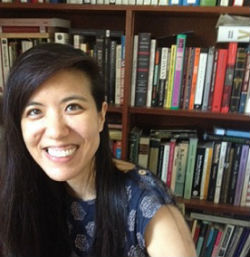Jennifer Dorothy Lee
 Jennifer Dorothy Lee is Assistant Professor of East Asian Art in the Department of Art History, Theory, and Criticism at the School of the Art Institute of Chicago. She holds a Ph.D. from New York University in East Asian Studies and modern Chinese literature. Recently she presented work at the French Centre for Research on Contemporary China at the University of Hong Kong, and the Amsterdam Institute for Social Science Research. Lee is editing a special issue of Frontiers of Literary Studies in China, and is working on her first book manuscript, Anxiety Aesthetics: Maoism and Beyond.
Jennifer Dorothy Lee is Assistant Professor of East Asian Art in the Department of Art History, Theory, and Criticism at the School of the Art Institute of Chicago. She holds a Ph.D. from New York University in East Asian Studies and modern Chinese literature. Recently she presented work at the French Centre for Research on Contemporary China at the University of Hong Kong, and the Amsterdam Institute for Social Science Research. Lee is editing a special issue of Frontiers of Literary Studies in China, and is working on her first book manuscript, Anxiety Aesthetics: Maoism and Beyond.
Abstract
Imaging Thought, Abstracting Beauty: Calligraphic Turns after Mao
Gestural abstraction left deep imprints on modernist practices throughout mid-20th century Asia. Given the dominance of mimetic representational practices in Maoism, China constitutes a notable exception to this global history of art in Asia. This paper explores the peculiar negotiation of the pictorial and the calligraphic that allowed abstract art to take hold in the Cultural Revolutionary aftermath. Focusing on painter-essayist Wu Guanzhong’s (吴冠中, 1919–2010) bold turn away from the pictorial in the late 1970s, I consider how Wu’s writings and brushwork embraced a mixed mode of calligraphic expression that redefined abstraction for the post-Mao context. Wu openly challenged Maoist prioritization of images, promoting the remoteness of abstract modes including traditional ink (水墨) and calligraphic art (书法). How did such conceptual exploration contribute to a new embrace of abstract forms, divested of an explicit relation to the real, after Mao?